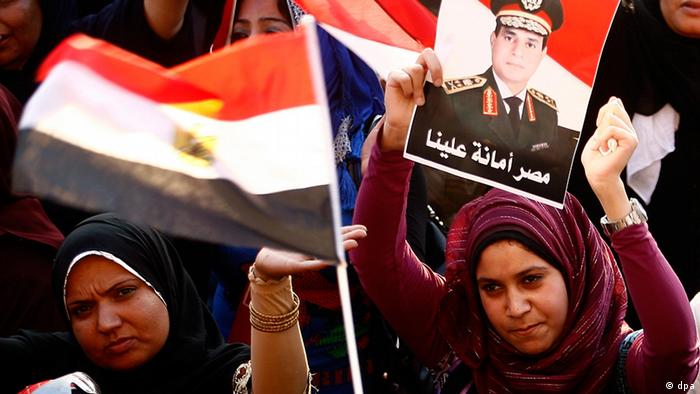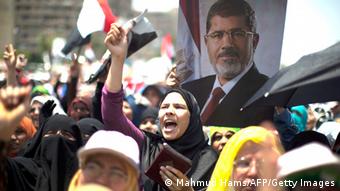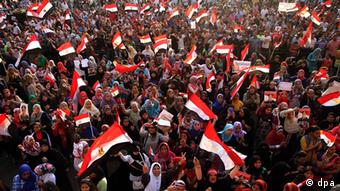The violence in Cairo has stopped. But new demonstrations have already been announced. In the meantime, the demonstrators on Tahrir Square are lauding the military and attacking the Muslim Brotherhood.
Following the eruption of violence between pro-Morsi protesters and anti-Islamists on the streets of Cairo, a fragile peace has returned for the moment. Though there is a bigger police and army presence at some intersections, most of the cafes and shops are open as if nothing had happened. Families are strolling the sidewalks, and young couples are walking along the Nile.
Those that fought pitched battles with supporters of the Muslim Brotherhood in recent days are only to be seen on Tahrir Square. They are mostly youths from poorer backgrounds - the upper middle classes are hardly to be seen.
Violence condemned
Reaction to the violence has been mixed. Some see it as a temporary eruption that will dissipate in one or two weeks. But others fear new, more serious confrontations. "I was very sad and upset by what happened yesterday," said 33-year-old Abier. "I think the Egyptians will now fight like in a civil war. It was awful."
A lot of people are now hoping that the police and military will keep the Islamists under control. But unless they are reintegrated into a future political system, it is likely that some will become radicalized. The new president's attempts at dialogue with the Muslim Brotherhood have so far remained fruitless.
Meanwhile anti-Islamist attacks have been raining down from the pulpits on Tahrir Square. One speaker called on the crowd to prevent any members of the Brotherhood among circles of family and friends from coming to Cairo, since the size of the Islamist demonstrations is mainly down to the many Muslim Brothers coming into the city from Egypt's provinces.
Nationalism and anti-Americanism
Apart from attacks on the Islamists, the people on Tahrir Square are mainly motivated by a rampant nationalism coupled with anti-Americanism. "I don't want foreigners interfering in Egyptian affairs," says Ahmed. "Especially the USA. They should behave fairly to Egyptians. They should be aware of that."
Patriotic songs are constantly ringing out on the square, with demonstrators singing along euphorically, usually holding an Egyptian flag. There are also a few "God is Great" calls to be heard, to make clear that the Muslim Brotherhood does not have a monopoly on representing Islam.
Blind trust in the military
The new bestseller on the square where the Egyptian revolution began is a paper portrait of current Defense Minister Abdel Fattah al-Sisi. It costs 10 cents (7.8 euro cents) - affordable for anyone. The military has almost become an object of worship for many demonstrators.
No one here doubts the integrity of the armed forces. But why did the army not intervene to stop the fighting the day before and block only one Nile bridge as the Islamists marched on Tahrir Square? Magdy, an IT specialist, dodges the question. "It's true the military only came later," he said. "But the army is spread out across Egypt - it can't be everywhere it's needed. The people defended themselves anyway."
But despite all the reverence for the military, most of the demonstrators now expect democratic elections, and most also want the Islamists to take part. But that will only happen if the violence does not return in the next few days. The next major demonstrations have already been announced. dw de




No comments:
Post a Comment